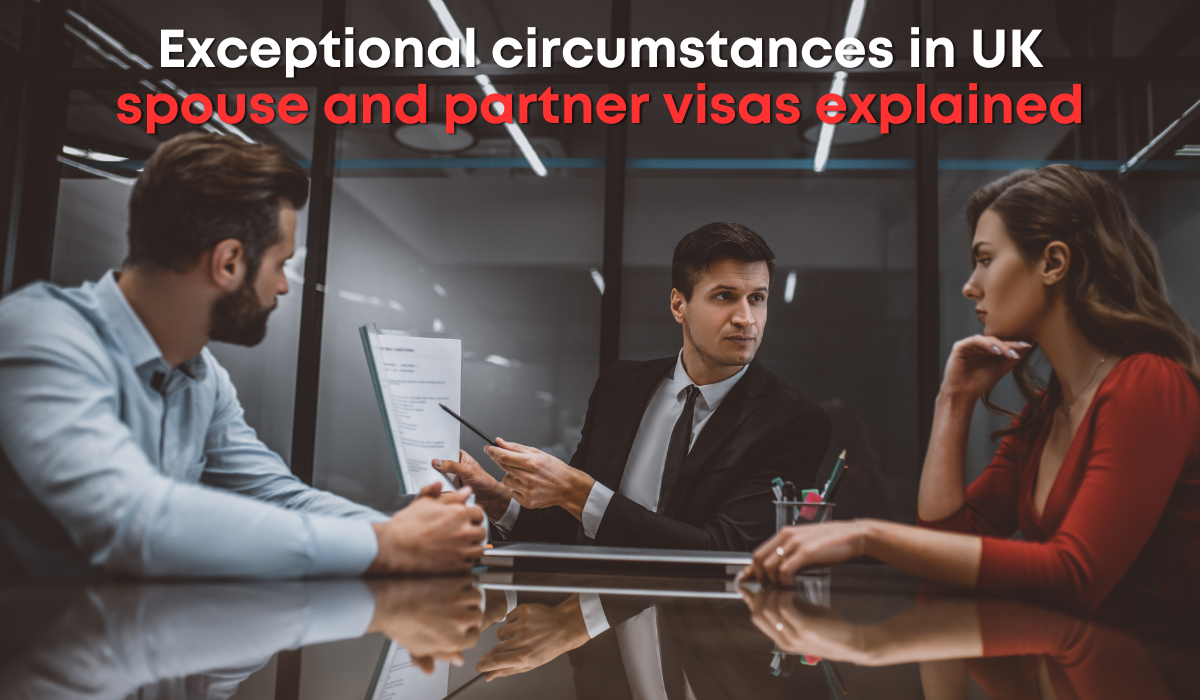n the intricate landscape of UK immigration law, the spouse or partner visa application under Appendix FM presents its own unique challenges. This visa pathway is primarily for those intending to live in the UK with a spouse or partner who is either a British citizen, settled person, refugee, or under humanitarian protection. However, the stringent financial and other requirements can sometimes pose significant hurdles.
What are the exceptional circumstances in a UK spouse or partner visa?
The term “exceptional circumstances” appears frequently within the guidelines of Appendix FM. It refers to situations where failing to grant leave to enter or remain would contravene the applicant’s right to private and family life under Article 8 of the European Convention on Human Rights, potentially leading to “unjustifiably harsh consequences” for the applicant or their family.
This high threshold demands more than proving hardship; applicants must show that the consequences of not being granted the visa are severe and disproportionate, making compliance with standard requirements impossible or unreasonable.
What are the financial requirements under exceptional circumstances?
Under normal circumstances, applicants must meet a minimum income threshold to sponsor a spouse or unmarried partner. This threshold is set at £18,600 for those already within the route before April 11, 2024, and increases with the inclusion of dependent children. From April 11, 2024, the threshold for new applicants has risen to £29,000, irrespective of children.
However, if an applicant can demonstrate exceptional circumstances, the standard financial requirements may be relaxed. This could involve considering alternative sources of income or financial support not typically accounted for under the standard rules. The rules allow for income from a third party, prospective employment earnings, or other credible sources when standard requirements can’t be met due to exceptional circumstances.
Suitability and eligibility to be considered for exceptional circumstances
Despite the potential for flexibility under exceptional circumstances, applicants must still satisfy core suitability and eligibility criteria. These include proving the genuineness of the relationship and, where applicable, the English language requirements. Importantly, certain criminal convictions or breaches in immigration history could still lead to a visa refusal, underscoring the need for comprehensive legal advice when preparing an application.
What is the role of documentation in proving exceptional circumstances?
Providing robust documentation is critical. Applicants should furnish evidence that supports the existence of exceptional circumstances, such as detailed personal statements and third-party affidavits. This documentation should convincingly link the applicant’s circumstances to the stringent criteria set out in the immigration rules.
Practical tips for the applicants
Applicants facing difficulty meeting standard requirements should:
- Thoroughly document their personal, social, and financial circumstances.
- Provide detailed evidence of any factors that might contribute to exceptional circumstances.
- Consider consulting with a specialised immigration solicitor who can offer tailored advice and guide the preparation of a compelling application.
The pathway through Appendix FM for spouse or partner visas, under exceptional circumstances, is complex and demanding. However, with the right approach and expert guidance, it is possible to handle these challenges successfully. Applicants should focus on substantiating their claims with strong evidence and remain mindful of the overarching requirement to prove that refusing the application would result in disproportionately harsh outcomes.
For further assistance or to discuss your personal circumstances in detail, consider reaching out to specialised legal professionals who can provide insights and support tailored to your specific situation.
Get in touch: For a comprehensive understanding of your options or queries on UK immigration matters, contact GigaLegal Solicitors at 02074067654 or click here to book a no-obligation consultation with an immigration expert.


